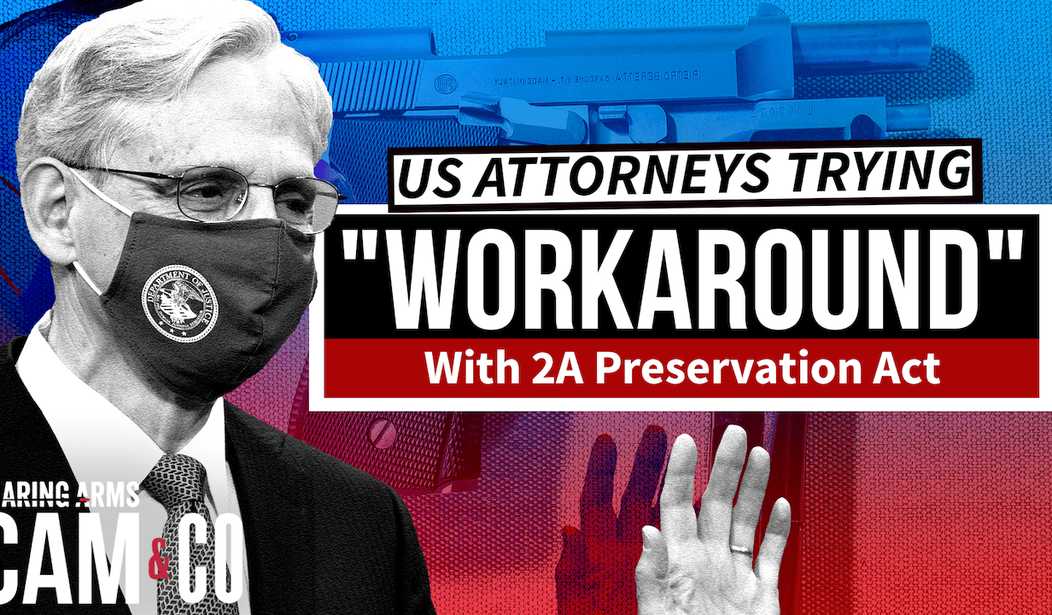Shortly after Missouri’s Second Amendment Preservation Act was signed into law by Gov. Mike Parson, the Biden administration fired off an attack of the new measure in the form of a letter from the Department of Justice to Parson and Missouri Attorney General Eric Schmitt alleging that the SAPA violated the Supremacy Clause of the U.S. Constitution. Since then, however, the administration has been mostly mum on the new law. A couple of counties in Missouri have launched legal challenges to SAPA in state court, but the DOJ hasn’t followed suit with federal litigation.
Instead, as the Kansas City Star reports, the Department of Justice is quietly trying to find ways to work around some of the provisions of the law, which forbid state and local law enforcement agents from cooperating with their federal counterparts in enforcing any federal gun control statutes that aren’t mirrored in Missouri law. On today’s Bearing Arms’ Cam & Co we’re taking a look at those efforts, as well as why the anti-gun Biden administration doesn’t appear eager to test the constitutionality of the Second Amendment Preservation Act in federal court.
According to emails obtained by the Star, one federal official is hoping to use prosecutors’ subpoena powers to compel local law enforcement to testify in federal gun cases.
Les Kerr, law enforcement coordinator for the U.S. Attorney’s Office in the Western District of Missouri, wrote in a June 17 email to police in his jurisdiction that the U.S. Department of Justice “does not think this law is a proper legislative act.” The email was obtained by The Star through a public records request.
“There is no doubt that every law enforcement agency in the Western District of Missouri is confused as to how to proceed, and, while we cannot tell you how to proceed, we can let you know that the Department of Justice is taking this very seriously,” Kerr wrote. “Additionally, you should know that in the future, whenever our office needs a TFO to testify before a Grand Jury or in a Hearing in a case that could be impacted by the Missouri SAPA we will compel their presence via subpoena in hopes that compulsory attendance will afford you a measure of protection.”
The second sentence is an apparent reference to local task force officers who work alongside federal agents. Federal agencies run a variety of task forces related to guns and drugs across Missouri, and often provide extra funding for local departments. Last year the Justice Department launched Operation LeGend in Kansas City and St. Louis, in response to record gun violence in Missouri.
In his email, Kerr referred to Missouri’s dispute with President Joe Biden’s Justice Department over the scope of the new law. The matter is also the subject of a lawsuit brought by St. Louis city and county against the state. Jackson County joined the lawsuit this month, arguing it is at unfair risk of liability because of its 87 law enforcement officers “who regularly enforce federal gun laws.”
Kerr can repeat the DOJ’s claim that the Second Amendment Preservation Act isn’t a “proper legislative act” all he wants, but the fact remains that his office is trying to to work within the confines of the law instead of simply ignoring it.
As for the workaround itself, it may help the U.S. Attorney in existing cases, but there’s a big difference between subpoenaing a police officer to testify about a previous arrest and trying to compel law enforcement to take part in federal investigations going forward.
The Star also highlighted another email from the U.S. Attorney’s office to an FBI field agent and a member of the Independence, Missouri police department regarding an existing case. The U.S. Attorney reasoned that, since the case may end up revolving around federal gun charges, he would list the FBI agent as the agent overseeing the case in an attempt to keep the detective from potentially running afoul of the Second Amendment Preservation Act.
“I am anticipating possible 924(c) charges,” [Patrick] Edwards wrote on July 6, referring to the section of federal law that sets stiffer sentences for certain crimes if the defendant possessed a firearm.
“With Missouri’s Second Amendment Preservation Act in place, having (the FBI agent) as the case agent could protect (the Independence detective) from issues down the road,” he continued. “I’m hoping that everyone comes to their senses.”
He wrote that he did not believe those kinds of gun charges should make local officers liable under the Second Amendment law,“but until we have some finality on the issue, I want to be cautious.”
I actually see this as a positive sign, though I suspect that these efforts to work within the confines of SAPA are coming from the U.S. Attorney’s office itself, and not from higher-ups in Washington, D.C. It seems to me that Joe Biden and Merrick Garland are content, at least for now, to issue press releases bashing Missouri’s new law, while letting St. Louis and Jackson counties take the lead on actually litigating the constitutionality of the measure. If state courts uphold the law, the administration could still challenge SAPA in federal court, but in the meantime they can take a more hands-off approach and try to figure out ways to at least bring in local law enforcement to testify in ongoing cases.
If the White House was truly confident that Missouri’s law violated the U.S. Constitution, I don’t think Merrick Garland would have hesitated to bring suit against the state. The fact that he hasn’t done so says quite a bit, and the fact that U.S. Attorneys are instead looking for ways to workaround the new law is even more telling.









Join the conversation as a VIP Member